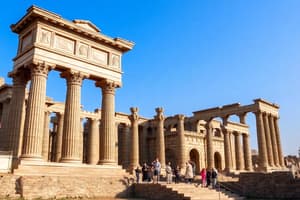Podcast
Questions and Answers
What defines the Prehistoric Era?
What defines the Prehistoric Era?
- Rise of political structures
- Development of trade routes
- Time before written records (correct)
- Beginnings of major empires
Which period is characterized by the rise of civilizations like Mesopotamia and Egypt?
Which period is characterized by the rise of civilizations like Mesopotamia and Egypt?
- Ancient History (correct)
- Renaissance
- Middle Ages
- Classical Period
During which period did the Industrial Revolution occur?
During which period did the Industrial Revolution occur?
- Modern History (correct)
- Renaissance
- Middle Ages
- Classical Period
What is a significant theme in history that involves trade, migration, and warfare?
What is a significant theme in history that involves trade, migration, and warfare?
Who is known for founding the Mongol Empire?
Who is known for founding the Mongol Empire?
What method involves studying historical events in the order they occurred?
What method involves studying historical events in the order they occurred?
What significant change occurred during the Middle Ages?
What significant change occurred during the Middle Ages?
Which historical figure is known for advocating non-violent resistance?
Which historical figure is known for advocating non-violent resistance?
Flashcards are hidden until you start studying
Study Notes
Key Concepts in History
- Definition of History: The study of past events, particularly in human affairs.
Major Periods in History
-
Prehistoric Era
- Time before written records.
- Includes the Stone Age, Bronze Age, and Iron Age.
-
Ancient History
- Starts around 3,500 BC.
- Development of writing, early civilizations (Mesopotamia, Egypt, Indus Valley, China), and empires (Persian, Roman).
-
Classical Period
- Approximately 500 BC to 500 AD.
- Rise of the Greek and Roman civilizations.
- Development of philosophy, science, and art.
-
Middle Ages
- 5th to 15th century.
- Fall of the Roman Empire, Feudalism, rise of Christianity, and the Byzantine Empire.
-
Renaissance
- 14th to 17th century.
- Cultural revival in arts, literature, and science in Europe.
- Humanism and exploration.
-
Modern History
- 17th century to present.
- Industrial Revolution, enlightenment, colonialism, world wars, and the Cold War.
Important Themes in History
-
Cultural Exchange
- Trade, migration, and warfare lead to the exchange of ideas, technology, and culture.
-
Conflict and Cooperation
- Wars often prompt changes in borders, governments, and societal structures.
- Diplomacy and treaties can unite nations or cultures.
-
Economic Systems
- Evolution from barter systems to mercantilism, capitalism, and socialism.
-
Political Developments
- Rise and fall of empires, establishment of democracy, monarchy, and totalitarian regimes.
-
Social Structures
- Changes in class systems, gender roles, and societal norms over time.
Important Historical Figures
- Alexander the Great: Conquered much of the known world by age 30.
- Julius Caesar: Key figure in the rise of the Roman Empire; assassinated in 44 BC.
- Genghis Khan: Founded the Mongol Empire, influencing vast territories.
- Mahatma Gandhi: Leader of the Indian independence movement, known for non-violent resistance.
Study Approaches
- Chronological Method: Studying events in the order they occurred.
- Thematic Method: Focusing on specific themes (e.g., gender, economy) across different periods.
- Comparative Method: Analyzing similarities and differences between events or cultures.
Tips for Studying History
- Utilize timelines to visualize events.
- Create flashcards for key terms and figures.
- Analyze primary sources for firsthand accounts.
- Engage in discussions to solidify understanding of complex ideas.
Definition of History
- Study of past events, especially related to human affairs.
Major Periods in History
- Prehistoric Era:
- Before written records
- Includes the Stone Age, Bronze Age, and Iron Age
- Ancient History:
- Starts around 3,500 BC
- Development of writing
- Early civilizations (Mesopotamia, Egypt, Indus Valley, China)
- Empires (Persian, Roman)
- Classical Period:
- Approximately 500 BC to 500 AD
- Rise of Greek and Roman civilizations
- Development of philosophy, science, and art
- Middle Ages:
- 5th to 15th century
- Fall of the Roman Empire
- Feudalism
- Rise of Christianity
- Byzantine Empire
- Renaissance:
- 14th to 17th century
- Cultural revival in arts, literature, and science in Europe
- Humanism and exploration
- Modern History:
- 17th century to present
- Industrial Revolution
- Enlightenment
- Colonialism
- World Wars
- Cold War
Important Themes in History
- Cultural Exchange:
- Trade, migration, and warfare led to the exchange of ideas, technology, and culture
- Conflict and Cooperation:
- Wars often changed borders, governments, and societal structures
- Diplomacy and treaties can unite nations or cultures
- Economic Systems:
- Evolution from barter systems to mercantilism, capitalism, and socialism
- Political Developments:
- Rise and fall of empires
- Establishment of democracy, monarchy, and totalitarian regimes
- Social Structures:
- Changes in class systems, gender roles, and societal norms over time
Important Historical Figures
- Alexander the Great: Conquered much of the known world by the age of 30
- Julius Caesar: Key figure in the rise of the Roman Empire; assassinated in 44 BC
- Genghis Khan: Founded the Mongol Empire, influencing vast territories
- Mahatma Gandhi: Leader of the Indian independence movement, known for non-violent resistance
Study Approaches
- Chronological Method: Studying events in the order they occurred
- Thematic Method: Focusing on specific themes (e.g., gender, economy) across different periods
- Comparative Method: Analyzing similarities and differences between events or cultures
Tips for Studying History
- Utilize timelines to visualize events
- Create flashcards for key terms and figures
- Analyze primary sources for firsthand accounts
- Engage in discussions to solidify understanding of complex ideas
Studying That Suits You
Use AI to generate personalized quizzes and flashcards to suit your learning preferences.




